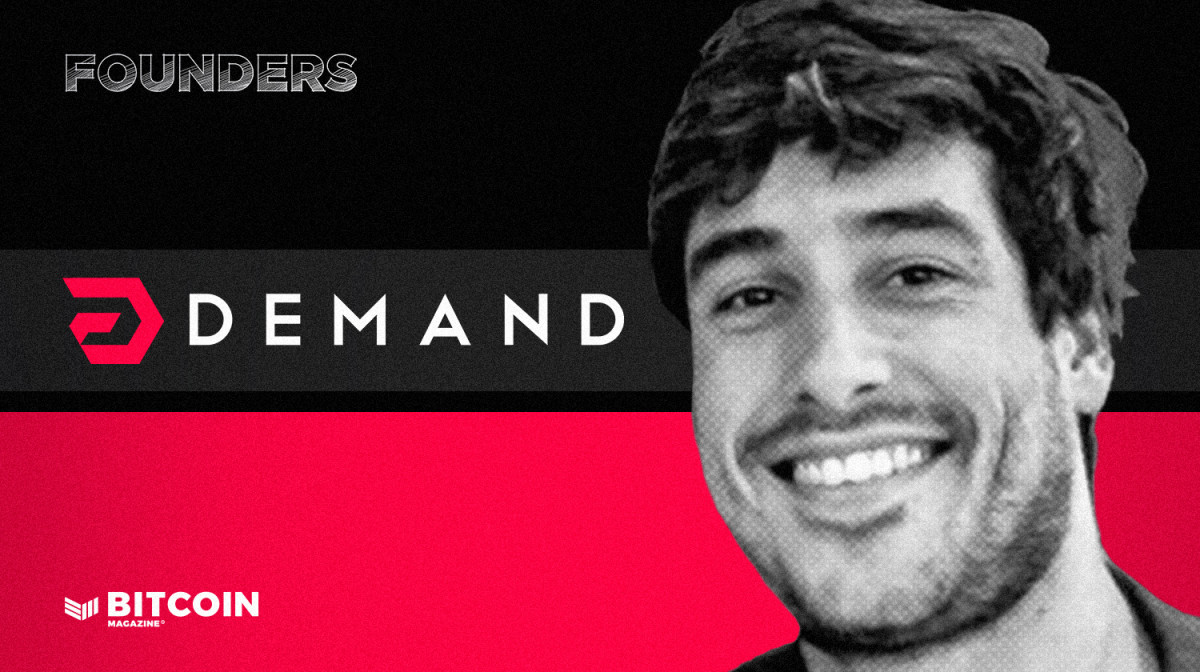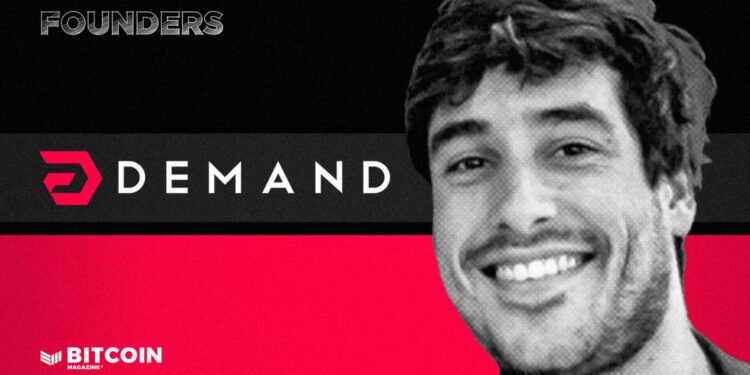
Firm Title: DEMAND
Founders: Alejandro De La Torre and Filippo Merli
Date Based: 2023
Location of Headquarters: Lisbon, Portugal and Florence, Italy
Quantity of Bitcoin in Treasury: “Presently being bootstrapped”
Variety of Staff: 2
Web site: https://www.dmnd.work/
Public or Personal? Personal
Alejandro De La Torre is deeply involved that Bitcoin mining is just too centralized, and he’s on a mission to alter that. Because of this he began DEMAND, a Bitcoin mining pool that places energy again within the arms of impartial Bitcoin miners.
Earlier than stepping into how DEMAND works, although, it’s vital to grasp what De La Torre has discovered from his time within the Bitcoin mining trade in order to raised perceive his motivation in beginning DEMAND.
De La Torre’s Historical past In The Bitcoin Mining House
De La Torre has served because the VP of Poolin, one of many largest Bitcoin and crypto mining swimming pools on this planet, in addition to the VP of Enterprise Operations for BTC.com, which additionally operated its personal Bitcoin mining pool. What he noticed throughout his time in these two roles made him notice that there was little time to waste in decentralizing the Bitcoin mining panorama.
“The expertise I had within the final swimming pools made me notice that we wanted a change within the mining pool trade and we wanted it very, in a short time,” De La Torre advised Bitcoin Journal. “There is a very clear drawback with centralization in mining swimming pools immediately, and I used to be in a position to pinpoint that problem whereas working at BTC.com and Poolin.”
De La Torre went on to explain what number of Bitcoin mining swimming pools at the moment are proxies for a bigger pool, which he didn’t point out by identify (it’s Antpool), and defined that such centralization has the ability to noticeably injury Bitcoin.
“The anchor pool is near 50% of the community now. It permits for a 51% assault on the community, which might be catastrophic,” mentioned De La Torre.
“I don’t suppose they’d ever do it, however the risk is there, which is already an enormous crimson flag,” he added.
De La Torre additionally identified that such ranges of centralization pose dangers on the subject of community censorship, highlighting that it wouldn’t be tough for this main pool to censor half of the transactions on the Bitcoin community.
The potential for censorship and a 51% assault “are a really clear and current hazard that we’ve in Bitcoin proper now,” based on De La Torre.
Energy To The Solo Miners
In response to this, De La Torre and his enterprise companion, Filippo Merli, launched DEMAND Pool in November 2023 with the intention of placing the ability again within the arms of solo miners.
DEMAND is the world’s first Stratum V2 mining pool. Stratum V2 is an open-source messaging protocol that permits miners and swimming pools to speak straight with one another, lowering mining infrastructure necessities in comparison with its earlier iteration, and enabling solo miners to decide on their very own mining templates.
“Swimming pools immediately are those who’re in command of constructing the blocks and including the transactions into the blocks,” mentioned De La Torre. “With Stratum V2 — with DEMAND — the miners themselves will be capable to construct the blocks and add the transactions that they need.”
Most filtering in mining swimming pools immediately is completed on the pool degree, not the person miner degree. De La Torre understands that, particularly within the wake of the introductions of protocols like Ordinals and Runes, miners need extra management over what kinds of transactions they embody of their blocks. And De La Torre believes miners ought to have this energy, as a result of it provides to the ethos of decentralization. He additionally added that DEMAND will settle for any blocks despatched to the pool.
“This offers me much less energy. That is what I need. I do not need the ability. I am completed with that energy,” mentioned De La Torre. “I’ve had it earlier than, and it is an excessive amount of energy within the arms of too few. And that is not what Bitcoin is. Bitcoin is decentralization, and that is furthering that.”
Incentivizing Solo Miners
De La Torre is conscious that the chances of mining a block are towards small-scale solo miners, however he doesn’t suppose they shouldn’t give discovering one a shot, and he’s additionally created different methods to incentivize solo miners to come back on-line.
“You’ve obtained to warmth up your house throughout winter, proper? Why not simply use a Bitcoin miner as a heater?” mentioned De La Torre.
“In the event you’re fortunate, you hit a block and also you simply made your spouse very glad,” he added with fun.
Solo miners who be a part of DEMAND Pool may even have the choice to promote the hash charge they produce on a market, making certain that they obtain some earnings for his or her efforts. DEMAND has arrange a cope with the hash charge market Rigly and plans to ascertain extra partnerships.
De La Torre additionally touched on how DEMAND funds will likely be completed by way of the PPLNS (Pay Per Final N Share) system. With PPLNS, income are allotted primarily based on the quantity blocks a mining pool mines per day and payouts fluctuate primarily based on the pool’s luck in mining blocks.
This method differs from the FPPS (Full Pay Per Share) system, which is usually used within the main mining swimming pools. With FPPS, the mining service cost and block reward are settled primarily based on theoretical revenue, and miners receives a commission whether or not the pool finds a block or not.
De La Torre is conscious that it could sound engaging to miners to receives a commission persistently with FPPS, however he was fast to level out that payouts by means of each PPLNS and FPPS are comparable over the long run.
“Lots of people have some misunderstandings about PPLNS,” mentioned De La Torre.
“FPPS offers you fixed payouts, which is ok. I perceive why a miner would discover FPPS. Nevertheless, PPLNS over sufficient time averages out to about the identical,” he added.
“Sure, you will not have fixed payouts, however you’ll have incorrect payouts based on how a lot hash charge DEMAND has — and we intend to have a great quantity. You’ll nonetheless be getting a continuing payout, or it will common out to roughly the identical. So, there isn’t any actual draw back to it.”
De La Torre additionally identified that solo mining as a part of DEMAND’s pool is without doubt one of the greatest methods for Bitcoin fanatics to get their arms on non-KYC bitcoin.
He additionally confused the truth that solo miners’ coming on-line will do one thing else that’s important to conserving Bitcoin decentralized — it’s going to carry extra nodes on-line.
Ship Nodes
To make use of DEMAND’s block templates, miners need to run their very own nodes. Because of this solo miners wouldn’t solely contribute to the decentralization of Bitcoin’s hash charge but in addition to the decentralization of its governance.
“Not solely do we wish the solo group and the house mining group to flourish and to make more cash, however we additionally need node proliferation,” mentioned De La Torre.
“Solo miners will present hash charge to safe the community and probably make some bitcoin and likewise assist with sustaining Bitcoin Core or no matter Bitcoin shopper they need. Nodes are good for the well being of the system,” he added.
Wanting Forward
De La Torre additionally mentioned that DEMAND is presently engaged on increasing its providers to pooled mining, and that DEMAND will actively be on the lookout for miners to come back on board.
He’s vowed to make DEMAND a “secure and reliable pool with clear payouts,” differentiating it from the “black field” swimming pools on the market.
De La Torre appears to be doing every thing in his energy to carry extra impartial miners on-line, and as he laid out his plans for DEMAND in my dialog with him, there was a palpable sense of urgency in his voice.
“The centralization of Bitcoin mining swimming pools is turning into a really critical problem, and it is as much as us because the mining group to do one thing about it,” mentioned De La Torre. “If we don’t, it’s not good.”




















